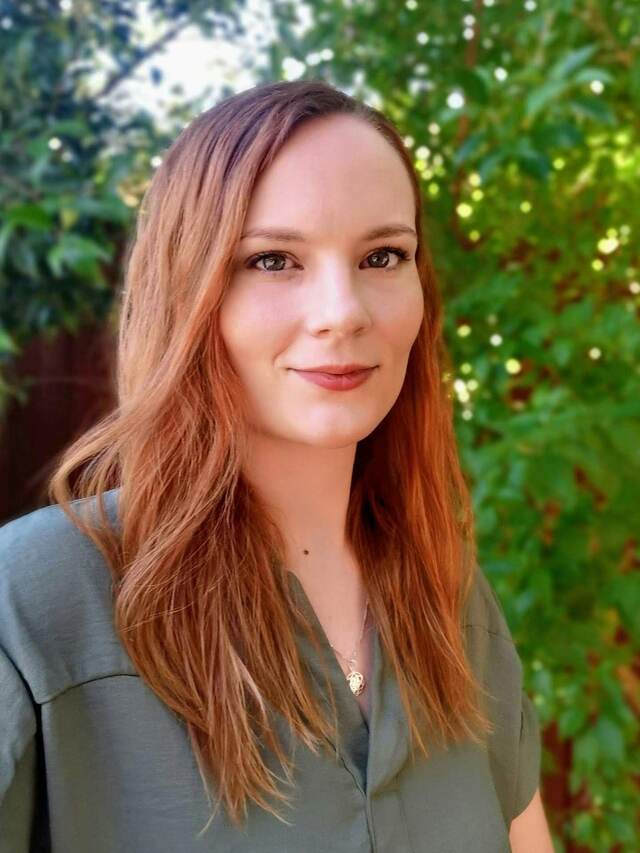PRECEDE:
Dr Cammi Murrup-Stewart’s journey through pregnancy and motherhood has been complex.
The Gidget Foundation Australia ambassador is a proud Indigenous woman living with mobility, pain, and fatigue disabilities as well as hearing loss.
The mental health researcher and academic faced a lot of anxiety about her ability to parent with her disabilities.
Once her daughter, Arinya, was born, Cammi had to find an approach to motherhood that suited her body while navigating a healthcare system that did not understand her needs.
*
I remember a conversation I had with friends when I was considering starting a family – I shared that I was terrified that I wouldn’t be able to do it.
Parenting is the hardest thing people can do, and parenting with a disability can be like stepping into a giant unknown.
I wasn’t sure how my body would cope, what the health implications would be for my child, how I would be able to care for a toddler running around when I couldn’t go everywhere or hear everything.
I was scared. But I wanted a child.
My friends who already had children kept saying, ‘You’ll be fine’.
It felt like they were brushing off my fears, but in hindsight, they were trying to say, ‘You’ll never be “ready” and everyone has their challenges’.
They knew me and my partner, knew our strengths and abilities, and knew they would be there to support me.
On reflection, much of the fear we had was because of the way ‘good’ and ‘bad’ parenthood is portrayed in our society.
We see this upheld in patriarchal ideas of bubbly stay-at-home mums visiting playgrounds, supported by happy and hardworking husbands, or social media ideas of funny mums with cute kids that might be a bit messy but definitely have the perfect sleep routine.
This is despite the fact we know most families don’t fit that idea of perfect.
Housing and food is expensive, climate change is terrifying, parental leave is never enough, and breastfeeding is HARD but so is formula feeding.
My kids won’t react the same way your kids will, the routine you have doesn’t fit with the chaos I have.
My family’s cultural makeup means we do things differently to yours. But this is all okay.
Parenting with a disability: The emotional and physical toll
For those of us navigating parenthood with a disability, the journey often includes layers of physical and emotional complexity that others might not see.
Managing health needs while caring for a little one can feel isolating and overwhelming, particularly when formal support systems fall short, and this can take a real toll on mental health, especially without adequate support systems.
In those early days, it’s easy to feel alone or unsure where to turn.
I recall a meeting with an occupational therapist, who was to help me set up my supports under NDIS while I had a very young newborn.
I wanted to know the equipment, services, and adjustments available to make parenting easier. Hearing this professional simply state that they didn’t know was terrifying.
They didn’t know how I was meant to use a cot in the manner recommended when I was in a wheelchair.
I explained to the maternal health nurse that I was really tired. They said that was normal for new mums, ignoring that my tiredness was compounded by my chronic illness and I needed help.
I was fortunate to have my mum’s help and a GP who went the extra mile in understanding my needs and my anxieties and coming up with helpful solutions, but I needed more than helpful professionals.
A message to friends, family, and community members
For parents like us, a community that understands and offers support without judgement can make all the difference in the world.
Sometimes it’s having a friend go and Google your conditions so they don’t pepper you with questions.
Sometimes it’s offering to change a meeting time to suit your needs.
Sometimes it’s a text message in the middle of the night to check in and ensure you’re not doom-scrolling and feeling lonely.
Sometimes it’s facing down the busybodies who stare in disapproval when you, a young and healthy-looking person, park in a disabled bay with your baby and disability parking permit.
So to the friends, family, and community members of parents with disabilities or parents of children with disabilities, know that your support truly matters.
Your encouragement, small gestures, and practical help can make a powerful impact on mental health and resilience.
If you’re wondering how to help, tackling ableism and creating space for our realities can make a huge difference.
Sometimes just being there to listen without judgment or giving us a chance to talk openly about our experiences is the greatest gift you can offer.
And sometimes, kids can offer the best example of that.
My daughter’s kinder classmates are fascinated by my wheelchair, asking questions their parents wouldn’t dare.
But their simple acceptance of difference (and joy at the idea of ‘riding’ in a wheelchair) gives me so much hope.
We can all learn so much from them.
By creating a culture of care and understanding, you are not only supporting that parent, you’re strengthening the entire community.
Building a culture of empathy and understanding
At the end of the day, community is about shared values, kindness, and empathy.
It can feel like many of those principles are lacking in our society at the moment.
Recognising the unique needs of parents with disabilities, or parents of children with disabilities, creates an environment where everyone is encouraged to ask for support without stigma.
For parents with disabilities, a supportive community can make the difference between isolation and connection, between struggle and resilience.
Sometimes we need help to build our self-compassion. We need that reminder that everyone does things differently and that we have each other’s backs.
Every small, thoughtful act from friends and neighbours can have a powerful effect on mental wellbeing.








